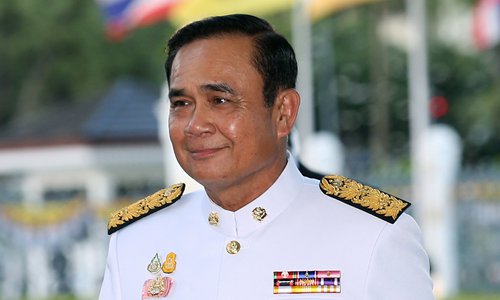HOME >> OPINION
Prayut’s fragile coalition faces challenges
By Yu Qun Source:Global Times Published: 2019/7/18 19:58:40

Photo: IC
In 2014, then Thailand's head of the army General Prayut Chan-o-cha led a military coup and overthrew the elected Yingluck Shinawatra government. Prayut then became the prime minister as head of the National Council for Peace and Order (NCPO). At the beginning of his reign, Prayut promised to hold an election as soon as possible. However, the election kept getting delayed. The Thai people had almost lost hope of electing their prime minister.
The election was finally held on March 24. The NCPO held power for five years, longer than any elected government. But a new cabinet was not set up immediately because none of the parties won the majority to independently form a government. Thus the new government was bound to be a coalition one. Palang Pracharath Party (PPRP) and other parties that support Prayut's reelection contested for the right to form a cabinet with the opposition Democratic Front led by former prime minister Thaksin Shinawatra's Pheu Thai Party.
On June 5, Prayut defeated Democratic Front's Thanathorn Juangroongruangkit with a clear margin of 500 votes to 244 and started his second term. Thai King Maha Vajiralongkorn on Tuesday swore in Prayut's cabinet. After a drawn-out political jousting, Prayut's new cabinet is finally in place.
On Monday, Prayut delivered a speech broadcast nationwide, announcing the end of the NCPO. Prayut has also turned from a prime minister who used a putsch to seize power into an elected prime minister.
But with the global economic slowdown and the ongoing US-launched trade war against China, Prayut's new cabinet is facing huge internal and external pressures, putting his leadership to test.
The economy and living standards are of primary concern. According to an opinion survey by Suan Dusit Rajabhat University, or Suan Dusit Poll, most Thai people want the new cabinet to do away with economic issues. Sixty-four percent of respondents said they want the cabinet to control consumer goods prices and increase salaries. The IMF recently cut its economic growth forecasts for Thailand 2019 to 3.3 percent from 3.5 percent in January. The Thai baht's appreciation has further harmed Thailand's exports. International economic uncertainty has seriously impacted Thailand's development.
Pheu Thai Secretary-General Anudith Nakornthap believes the economic downturn and the increasing gap between the rich and poor should be dealt with. Meanwhile, the Democrat Party also urged the government to raise the daily minimum wage to 400 baht ($13), the rate promised by PPRP during the election.
During the junta rule, an advisory board led by Deputy Prime Minister Somkid Jatusripitak was in charge of dealing with Thailand's economic issues. But in the new cabinet, many portfolios dealing with economic affairs have been taken up by representatives from other parties. For example, Democrat Party leader Jurin Laksanawisit became commerce minister.
In the past five years, the military-backed government was a cohesive whole, and all decisions were taken smoothly. But due to different understandings of economic affairs and various policy orientations, several political parties in the new cabinet will need more efforts to negotiate and coordinate to ensure the integrity and coherence of economic policies. This will be the new cabinet's top priority.
The government's stability is another issue. Prayut's ruling coalition is cobbled together by 19 parties, setting a new record in Thai political history. But the coalition won only by a slim margin in the lower house. Hence, the new cabinet's proposals, which need to pass through the lower house, are likely to be obstructed by opposition parties. Not only that, the opposition may even propose a vote of confidence against Prayut's cabinet.
The new cabinet is likely to encounter obstacles in the future. Major proposals of the government are likely to founder, resulting in delayed plans, lower efficiency, and scarce political achievements. Many political observers think Prayut's administration won't last long.
In addition, internal coordination might be a problem. The 19 parties in the ruling coalition are an amorphous lot in terms of political ideas, party interests, and policy orientations. The reason why it took so long to form the new cabinet was precisely due to the parties' power games.
The Democrat Party and Bhumjaithai Party, two key middle parties, jointly bargained with the PPRP in a bid to maximize their political interests, and finally gained several significant positions in the government. Some small parties even left the ruling coalition and sat in the opposition simply because their political demands could not be met. The fragility of Prayut's ruling coalition is evident.
In addition, the PPRP, which nominated Prayut as the prime ministerial candidate, was formed in haste and riddled with internal contradictions. There are major challenges awaiting Prayut in leading the new cabinet. Doing away with internal rifts, maintaining unity and harmony, administering efficiently, and building public confidence are a few of them.
All in all, Thailand is now beset with troubles from within and without. The worsening international economic and trade environment, and thorny livelihood issues, and the ruling coalition's internal and external conflicts, have all laid out a rocky path for Prayut's cabinet.
The author is deputy director at the Military Diplomacy Research Center of the College of International Studies, National University of Defense Technology. opinion@globaltimes.com.cn
RELATED ARTICLES:
Posted in: ASIAN REVIEW